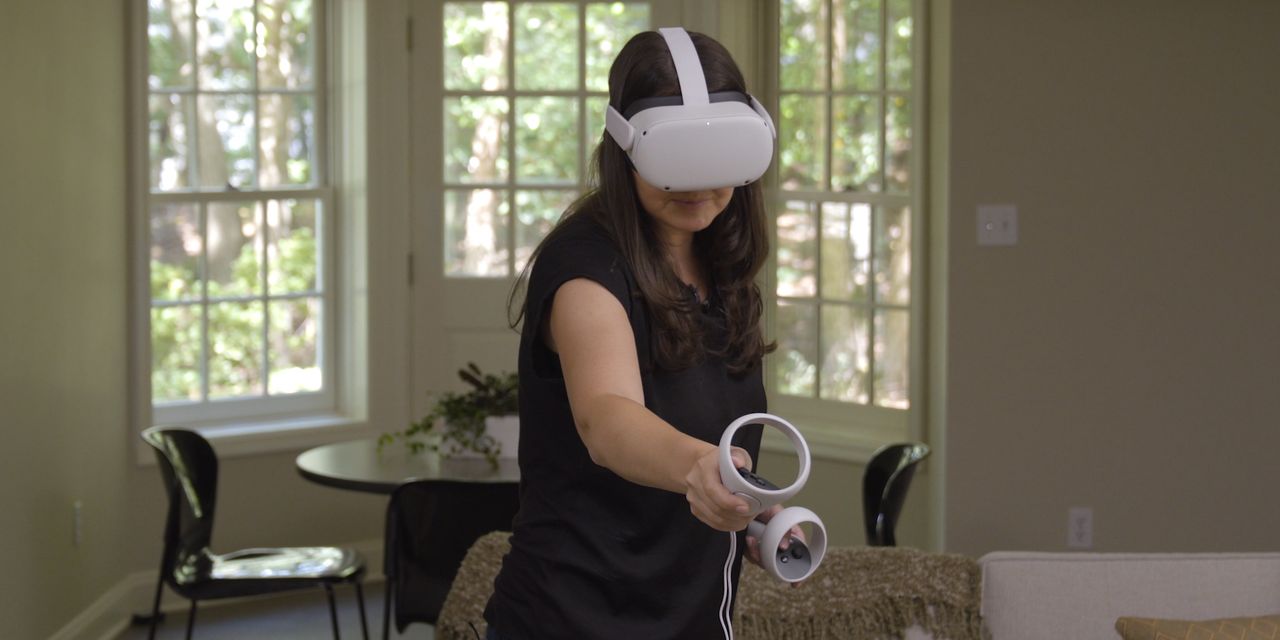It was Jeff Berling’s co-worker who warned him about the rash.
Soon after Mr. Berling, 58, bought the Quest 2, a virtual-reality headset made by Facebook Inc.’s Oculus, in July, the IT contractor was told he should purchase a face-pad insert from a third-party seller. The one that comes in the box, his colleague told him, was notorious for making users’ faces itchy and red.
“I was thinking, ‘Yeah right,’” said Mr. Berling, who lives in Imperial, Mo. “But sure enough, when I used my new Quest 2 for an hour or two, my face where the insert was touching got tingly, and the skin was red and itchy in the shape of the goggles.”
Facebook said last week that given the reports of skin irritation, it was voluntarily recalling the Quest 2’s removable foam facial pad and pausing sales of the headset until Aug. 24. When sales resume, a silicone cover that fits over the foam will be included in every box. People who already own the headset can request a free silicone cover online.
The U.S. Consumer Product Safety Commission said Facebook received more than 5,700 reports of skin irritation—including rashes, burning and hives—after use of the foam pad on the $299 Quest 2 headset, including 45 cases that required medical attention.
Since launching the Quest 2 in October 2020, Facebook has produced about 4 million of the foam facial interfaces in the U.S. and about 172,000 in Canada, either sold with the headsets or as separate accessories, Facebook said.
“While these reports represent a very small percentage of Quest 2 users, and the majority of reports remain unverified, we want every user to have a great experience with their Quest 2 headsets,” a Facebook spokesman said. The company changed its manufacturing process to reduce “a few trace substances” that could contribute to skin discomfort, the spokesman said, declining to give details.
The recall is unlikely to deter passionate users of virtual reality, said Gracie Page, managing director of technology for Europe, the Middle East and Africa at Group SJR, a marketing agency owned by
WPP
PLC. But it may add fuel to the fire for those already skeptical of virtual reality, she said. “This will be another drop in the ocean [for them], a ‘just one more thing,’” Ms. Page said.
Consumer virtual-reality headsets, though they have been around since the 1990s, haven’t caught on in the same way that voice assistant technology or smartphones did, Ms. Page said.
Besides Facebook’s Oculus, other makers of virtual-reality headsets include
HTC Corp.
and
Sony Group Corp.
Technology research firm International Data Corp. estimated that 5.6 million virtual-reality headsets were sold world-wide in 2020, up 2.5% from 2019, with Facebook accounting for 63% of shipments.
Sales have been curbed in part by the limited content available for virtual-reality headsets, said Tuong Nguyen, a senior principal analyst on the emerging technologies and trends team at research and consulting firm
Gartner Inc.
Although the headsets have been used in theme parks and even in doctors’ offices as an experimental form of therapy, their main use remains videogaming.
“Most of the content today is gaming, so what about users who don’t game, or don’t want to game?” Mr. Nguyen asked, adding that even within the videogame industry, the variety of content virtual reality offers is narrow in comparison with that of other consoles. Around 200 games can be played on Oculus Quest devices; by comparison, more than 2,600 games are available for
Microsoft Corp.’s
newest Xbox consoles.
The ergonomics of headsets is also an enormous barrier to virtual reality’s adoption, Mr. Nguyen said. The devices are heavy, and can lead to “VR neck,” a term used to describe the strain or pain felt after wearing them for a long time. The mismatch virtual reality creates between the eyes and the body can cause motion sickness. And on a practical level, the “blindness” caused by seeing one world while moving around another has led to accidents, Mr. Nguyen said.
Another hiccup: Many find the headsets ugly.
“There’s a usability…issue that needs to be addressed so people are happy to have them out on display in their homes,” Ms. Page said. “They either need to look more beautiful, so people are happy to have them out on display in their homes, or be less bulky and more mobile, so they can be put away and brought back out in a really fluid way.”
Vendors are “furiously working to make virtual-reality devices smaller and lighter,” according to Mr. Nguyen. Oculus, for example, reduced the weight of its Quest 2 headset to roughly 1.1 pounds, compared with 1.25 pounds for its predecessor, the Quest.
Mr. Berling, meanwhile, said the recall hasn’t deterred him from using the Quest 2. He hasn’t purchased any games yet, but has marveled at 360-degree videos of the Matterhorn, Mount Everest and Angel Falls. “It is pretty cool technology,” he said.
Write to Katie Deighton at katie.deighton@wsj.com
Copyright ©2021 Dow Jones & Company, Inc. All Rights Reserved. 87990cbe856818d5eddac44c7b1cdeb8













































